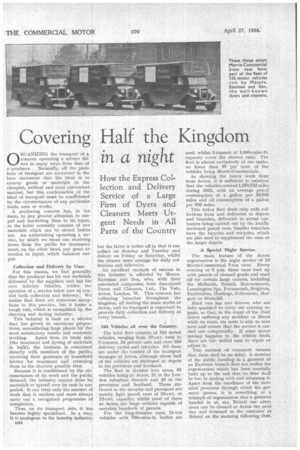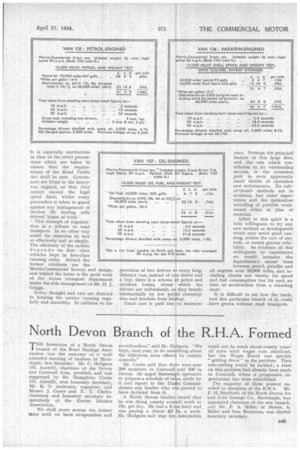Covering Half the Kingdom in a night
Page 110

Page 111

If you've noticed an error in this article please click here to report it so we can fix it.
0 RGANIZING the transport of a concern operating a service differs in many ways from that of aproducer. Naturally, all the problems of transport are contained in the bare statement that the ideal is to convey goods or materials in the cheapest, swiftest and most convenient manner, but this condensation of the ideal of transport must be conditioned by the circumstances of any particular trade, area or works.
A producing concern has, in the main, to pay greater attention to output and marketing than to its input, as the latter normally consists of raw materials which can be stored before use. An undertaking operating a service, by which we mean one receiving items from the public for treatment, must, on the other hand, pay great attention to input, which balances output.
Collection and Delivery by User.
For this reason, we find generally that the producer has his raw materials delivered by the suppliers and has his own delivery 'ehicles, whilst the operator of a service takes care tc control both collection and delivery. We realize that there are numerous exceptions to this practice, but it forms a rough rule, which is exemplified by the cleaning and dyeing industry.
This industry is built on a service that has grown to enormous proportions, necessitating large plants for the most satisfactory results and economic working. Apart from its trade side (the treatment and dyeing of materials in bulk), the business is concerned directly with members of the public, receiving their garments or household fabrics for treatment and returning them in the shortest possible time.
Because it is conditioned by the circumstances of its work and the public demand, the industry cannot store its materials or spread over its task in any period.. It can treat only the amount of work that it receives and must always carry out a recognized programme of completion.
Thus, on its transport side, it has become highly specialized. In a way, it is analogous to the laundry industry.
zei4 but the latter is better off in that it can collect on Monday and Tuesday and deliver on Friday or Saturday, whilst the cleaner must arrange for daily collections and deliveries.
An excellent example of success in this industry is afforded by Messrs. Eastman and Son, who, with their associated companies, form Associated Dyers and Cleaners, Ltd., The Vale, Acton, London, W. This concern has collecting branches throughout the kingdom, all feeding the maim works at Acton, and its transport is organized to provide daily collection and delivery at every branch.
124 Vehides all over the Country.
The total fleet consists of 124 motor vehicles, ranging from 10-cwt. vans to 3-tonners, 24 private cars and over 350 delivery cycles and tricycles. All these are under the control of the transport manager at Acton, although about half of the vehicles are stationed at depots in the provinces and Scotland.
The fleet is divided into areas, 61 vehicles being at Acton, 21 in the London suburban districts and 42 in the provinces and Scotland. Those stationed in the suburbs and provinces are mostly light parcel vans of 10-cwt. or 12-cwt. capacity, whilst most of those at Acton are large vehicles capable of carrying hundreds of parcels.
For the long-distance runs, 21-ton vehicles with 750-cubic-ft. bodies are used, whilst 8-tonners of 1,000-cubic-ft. capacity cover the shorter runs. The fleet is almost exclusively of one make, no fewer than 97 per cent, of the vehicles being Morris-Commercials.
As showing the heavy work done from Acton, it is sufficient to mention that the vehicles covered 1,270,752 miles during 1933, with an average petrol consumption of a gallon per 16.505 miles and oil consumption of a gallon per 682 miles.
This Acton fleet deals only with collections from and deliveries to depots and branches, deliveries to actual customers being.carried out by the locally stationed parcel vans. Smaller branches have the bicycles and tricycles, which are also used to supplement the vans at the larger depots.
A Special Night Service.
The main feature of the Acton organization is the night service of 10 Morris-Commercial 3-ton vans. Every evening at 6 pan. these vans load up with parcels of cleaned goods and start Off for certain large centres, including the Midlands, Bristol, Bournemouth, Leamington Spa, Portsmouth, Brighton, Eastbourne, Hastings, Folkestone, Margate or Westcliff.
Each van has two drivers, who are fully qualified to carry out running repairs, so that, in the event of the chief driver suffering any accident or illness while en route, his mate is able to take over and ensure that the service is carried out competently. If some minor mishap happens to the vehicle itself, there are two skilled men to repair or adjust it.
This method of transport ensures that there shall be no delay. A member of the public handing in a garment at an Eastman branch does not realize the organization which has been carefully built up to the end that no time shall be lost in dealing with and returning it. Apart from the excellence of the technical processes through which the garment passes, it is something of a triumph of organization that a garment handed in at, say, Bristol one afternoon can be cleaned at Acton the next day and returned to the customer at Bristol on the morning following that.
It is especially meritorious in view of the strict precautions which are taken to ensure that the requirements of the Road Traffic Act shall be met. Governnors are fitted to the heavyvan engines, so that they cannot exceed the legal speed limit, whilst every Precaution is taken to guard against any infringement of Section 19, dealing with drivers' hours of work.
This triumph of organization is a tribute to road transport. In no other way could the situation be met so effectively and so simply. The efficiency of the system depends on first class vehicles kept in first-class running order. Behind the former attribute are the Morris-Commercial factory and design, and behind the latter is the good work of the Acton transport department under the able management of Mr. IL J. Griggs.
Every thought and care are directed to keeping the service running regularly and smoothly. In addition to the
;provision of two drivers to every longstance van, instead of one driver and boy, there is a scheme of petrol and cident bonus, about which the drivers are enthusiastic, as they benefit substantially by low petrol consumption and freedom from mishap.
Great care is paid also to mainten ance. Perhaps the principal feature of this large fleet, and •the one which contributes to its outstanding success, is the attention paid to even apparently small details of operation and maintenance. No ruleof-thumb methods are in evidence, but strict supervision and the meticulous recording of possible weaknesses either in plan or material.
Allied to this spirit is a bold willingness to try any new method or development which may assist good running, reduce the cost of any item, or ensure greater reliability. As evidence of this willingness to experiment we would instance the department's recent tests between petrol, paraffin and oil engines over 10,000 miles, and including checks not merely for speed and fuel consumption but for such an item as acceleration from a standing start.
It is difficult to see how the trade, and this particular branch of it, could have grown without road transport.




















































































































































































